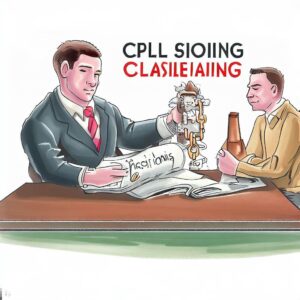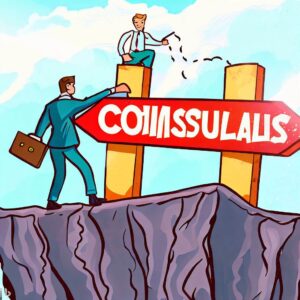Welcome to a comprehensive guide on mastering the art of closing sales! In the world of sales, closing the deal is the ultimate goal, but it’s not just about what you say in the final stages of a sale. This guide will take you through the strategies, techniques, and relationship-building skills necessary to become a master closer.
Mastering the Art of Closing Sales: Strategies, Techniques, and Relationship Building

Closing a sale is one of the most crucial elements in any sales process. It is what all sales professionals work towards, and it is what determines if their hard work will pay off or not. However, many salespeople make the mistake of thinking that closing is all about the people involved – the salesperson and the client – and what they say to each other. While these factors are undoubtedly essential, they are not the only ones that determine whether a sale will close successfully or not. In fact, having an effective process or plan in place for taking a client through the closing stages is far more critical than what anyone says during the final stages of a sale.
In this regard, lack of process is just one of the problems that salespeople face when it comes to closing a sale, particularly for consultative salespeople. Consultative sales professionals have gone to great lengths to emphasize their desire to form lasting relationships with clients. As such, they need to be cautious about how they apply pressure during the closing stages. They must learn to close the sale without ruining the relationship or making their clients doubt their motives. The challenge here is finding a way to close the sale effectively without becoming something they personally cannot stand.
One of the key things that salespeople need to understand is that the sales process does not end when they make the final pitch. Instead, the process continues even after the sale has been closed. Therefore, sales professionals must have a plan in place for what happens after the sale. This plan should include follow-up steps that ensure the client is satisfied with their purchase and feels valued as a customer. Having a well-defined post-sale process can differentiate successful salespeople from those who struggle to close deals.
Another important aspect of the closing process is understanding the motivations and concerns of the client. Salespeople need to identify the unique needs, wants, and pain points of the client and position their product or service as the solution to these challenges. This requires active listening and effective communication skills. Salespeople need to ask the right questions and listen attentively to the answers. They must also be able to articulate a compelling value proposition and provide relevant examples of how their product or service has helped other clients.
Once the sales professional understands the client’s motivations and concerns, they must identify the appropriate closing technique. There are several closing techniques that salespeople can use, depending on the situation. For example, the assumptive close is a technique where the salesperson assumes the sale has been made and asks the client about the next steps. The alternative close offers the client two options, both of which lead to a sale. These techniques require finesse and an understanding of the client’s personality and preferences.
Finally, sales professionals must avoid damaging the relationship with the client during the closing stages. They cannot afford to come across as pushy or manipulative, or they risk losing the client’s trust and business. Salespeople must find a way to apply the right amount of pressure without acting in a “counter-culture” way. One way to do this is to focus on the benefits that the client will receive from the purchase rather than on the product’s features.
Closing a sale is a critical component of any sales process. However, it is not just about what the salesperson says during the final stages of the sale. An effective process or plan for taking a client through the closing stages, before, during, and after the sale, is far more important. Consultative sales professionals must also be mindful of their relationships with clients and avoid damaging them during the closing stages. By understanding their clients’ motivations and concerns, identifying the appropriate closing technique, and focusing on the benefits of the purchase, sales professionals can successfully close sales and build lasting relationships with their clients.
Closing the Gap: Overcoming Challenges in Consultative Sales and Building Lasting Client Relationships

Consultative Selling is an approach that aims to build long-term working relationships between the salesperson and their clients. This method involves asking effective questions, listening actively, and probing the client to understand their problems, challenges, goals, and objectives. Once the salesperson has a good understanding of the client’s situation, they then present solution options that are tailored to meet specific needs. The goal is to present solutions that will become an integral part of the client’s ongoing business operation, maximizing their investment.
While this approach can be very effective in building trust and rapport with potential clients, consultative salespeople may struggle when it comes to closing deals. One of the primary reasons for this is that they, like most people, generally do not like conflict. Closing deals can often involve some level of conflict, where the salesperson is asking the client to take action of some kind. This can lead to arguments, disagreements, stalls, objections, lying, pressure, or silence, all of which can be loaded with potential conflict.
Another issue that consultative salespeople face is the fear of being seen as pushy or aggressive. They want to be liked by their clients and are nervous about coming across as too pushy or confrontational. This fear can cause them to avoid pushing too hard for the sale, leading to missed opportunities and lost revenue.
However, there are ways that consultative salespeople can overcome these challenges and improve their closing skills. One approach is to reframe the concept of “closing” in a more positive light. Rather than thinking of it as a confrontational or negative process, salespeople can view it as an opportunity to help their clients make a decision that will benefit them in the long run.
Another strategy is to focus on building strong relationships with clients from the outset. By taking the time to truly understand their needs and concerns, salespeople can build trust and credibility, making it easier to close deals when the time is right. This involves not only asking effective questions but also actively listening to their responses and providing thoughtful, tailored solutions that address their unique needs.
Consultative salespeople can also benefit from ongoing training and development in the area of closing skills. This may involve learning new techniques for overcoming objections or dealing with difficult clients, as well as practicing these skills in real-world scenarios. By continually honing their skills and staying up-to-date with the latest trends and best practices in sales, consultative salespeople can become more effective closers and build more successful long-term relationships with their clients.
While consultative selling can be an incredibly effective approach for building trust and rapport with clients, it can also present challenges when it comes to closing deals. Salespeople who struggle with this aspect of the process may be able to improve their skills by reframing the concept of closing in a more positive light, focusing on building strong relationships with clients, and investing in ongoing training and development. By doing so, they can become more effective closers and build more successful, long-term partnerships with their clients.
Striking the Balance: Effective Closing Strategies in Consultative Sales

Consultative sales is a unique approach to selling that focuses on understanding the client’s needs and providing tailored solutions. Unlike traditional sales styles, consultative salespeople avoid undue pressure on clients by overcompensating in the opposite direction. However, this can result in them not asking for action steps, which can prevent them from discovering underlying issues and ultimately closing deals.
Consultative salespeople are often afraid of being seen as old-school sellers, which can lead them to avoid putting any pressure on clients. This fear of rejection can cause them to back away from asking for commitments, making it difficult to solve problems, answer questions, and close deals effectively. They prioritize avoiding the discomfort of old-school selling over delving into the client’s problems, which ultimately hinders their ability to provide practical solutions.
Salespeople who adopt the consultative approach often fear being perceived as pushy or overbearing. If a client mentions that they feel pressured, it can make even the most skilled consultative salesperson uncomfortable and may cause them to run the other way. This is because consultative salespeople prioritise building relationships with clients and providing value, and they know that any perception of high-pressure tactics can damage these relationships.
Consultative salespeople tend to have a thorough understanding of their clients’ situations and conditions, which can put additional pressure on clients. Suppose a doctor tells you that you need to lose weight to lower your cholesterol levels without any evidence or prior testing. In that case, you might be less likely to take their advice seriously. However, if the doctor has already conducted tests and found that your cholesterol levels are dangerously high, their warning about the need to lose weight would come across as more urgent and necessary. Similarly, consultative salespeople must provide concrete evidence and tailor their solutions to their clients’ specific needs.
Consultative sales is an effective sales strategy that prioritizes understanding the client’s needs and providing tailored solutions. However, salespeople who adopt this approach must find a balance between avoiding undue pressure on clients and not compromising their ability to close deals effectively. They must also be prepared to provide evidence and specific solutions tailored to each client’s needs to build trust and avoid any perception of high-pressure tactics.
Navigating Closing Challenges: Strategies for Success in Consultative Sales

In sales, the ability to close deals is crucial for success. However, many consultative salespeople struggle with this aspect of their job. One common mistake that they make is forgetting that the “sales clock” has started as soon as they enter a sales call. Both the salesperson and the client are playing a role, and it is important to keep this in mind throughout the conversation.
Another issue that consultative salespeople face is the difficulty of suddenly transitioning into being a high-pressure closer in the middle of the sales cycle. They may not be familiar with non-confrontational closing strategies or may simply be uncomfortable with conflict. However, avoiding conflict altogether will not lead to success in sales. It is essential to ask for a commitment on something, even if it means dealing with some degree of conflict.
Additionally, consultative salespeople may not have enough prospects in their pipeline because they do not like engaging in prospecting activities. Prospecting can be challenging and is often tied directly to closing. However, having a healthy pipeline of potential customers is critical for sustained success in sales.
There are alternative strategies that consultative salespeople can use instead of high-pressure closing techniques. For example, they could focus on building relationships with their clients and understanding their needs and concerns. By doing so, they can tailor their approach to each individual client and create a personalized sales experience. This approach may take longer but is likely to result in more successful long-term relationships with clients.
Consultative salespeople should also aim to build trust with their clients. Clients are more likely to buy from someone they trust and believe has their best interests in mind. Salespeople can establish trust by demonstrating their expertise and knowledge about the product or service they are selling, being transparent about pricing and other details, and following through on their promises.
It is important for consultative salespeople to remember that sales is ultimately about meeting the needs of the client. By focusing on the client’s needs and concerns, salespeople can provide value and build long-lasting relationships. A successful sale is not just about closing a deal but also about creating a positive customer experience that leads to repeat business and referrals.
Consultative salespeople face several challenges when it comes to closing deals. However, by keeping the sales clock in mind, developing non-confrontational closing strategies, engaging in prospecting activities, focusing on building relationships and trust with clients, and ultimately meeting the needs of their clients, they can achieve long-term success in the world of sales.
Mastering the Art of Closing: Balancing Effectiveness and Client Needs in Sales

The concept of sales has been around for centuries and it’s a vital part of any business. It’s the process of identifying potential customers, pitching your product or service to them, addressing their concerns, and ultimately persuading them to buy from you. However, the sales process is not always easy, especially when it comes to closing deals.
Some people believe that if they can only work up the courage to prospect long enough to get five prospects into their sales pipeline, they’ll have to work harder at closing the few opportunities they have. This is because market conditions make it difficult to close deals. However, there are techniques that can be used to make the closing process easier.
While many people despise the hard sell techniques of “old school” sellers, these methods do work to some extent. Such techniques involve applying pressure and browbeating clients into making a decision. They may also persuade people to take action, which can result in closed sales. However, this approach is not sustainable in the long run and can harm the relationship between the seller and the client.
A better approach to closing deals is through consultative selling. This method focuses on meeting the needs of clients and getting them to take action. It stresses long-term partnerships and is more purposeful and direct in creating relationships. The goal is to always advance the sale and closing, but positioned as a good thing for the client first and foremost.
In addition, redefining the concept of closing can help sellers become more effective. Closing does not necessarily mean getting a “yes” decision exclusively. Instead, closing means making a decision, whether it’s a “yes” or a “no.” If sellers can gravitate towards “no” rather than accepting “maybe,” they’ll be much better off.
Closing should not be a process of pushing clients into making a “yes” decision; instead, it should be about helping clients make a decision that is best for them. This means that sellers should feel better about “closing the client” rather than needing to push them into a “yes” or else lose the deal. The bigger issue is that not closing can hurt both the client and the salesperson.
Closing deals is an essential part of the sales process. While hard sell techniques may work in some cases, consultative selling is a more effective approach in the long run. Redefining the concept of closing as a decision, whether it’s a “yes” or a “no,” can also help sellers become more effective. Ultimately, the goal should be to help clients make decisions that are best for them, which will ultimately benefit the seller as well.
The Critical Impact of Closing Sales: Consequences for Clients and Salespeople

The act of closing a sale is crucial to the success of both the salesperson and the client. When a potential buyer fails to make a purchase, it can have negative effects on both parties involved.
For clients who do not close a deal, they are forced to continue living with their existing pains and problems. These issues may worsen over time as they have not purchased the solution that would have resolved their concerns. The inability to close a sale means that clients remain stuck in their current situation, unable to make any progress towards resolving their issues. This can be detrimental to their well-being, happiness, and overall quality of life.
Additionally, when a client does not close a sale, it often means that the salesperson will continue to stalk them with follow-up calls and emails. Clients may be hesitant to provide honest feedback or bad news, which can lead to salespeople receiving false hope and becoming misinformed about the client’s actual position. This can cause confusion and unnecessary stress for both parties involved.
On the other hand, when salespeople fail to close a deal, it can lead to several negative consequences. Firstly, they will not make money or achieve success. Closing deals is the primary source of revenue for salespeople, and without the ability to do so, they cannot reach their financial goals. Not reaching these targets can cause a significant amount of stress and anxiety, affecting their well-being and job satisfaction.
Moreover, failing to close a sale can result in clogged pipelines, where a salesperson’s list of potential clients becomes cluttered with irrelevant leads. Salespeople may struggle to distinguish between viable leads and hopeless cases, leading to confusion, wasted time, and lost opportunities. A clogged pipeline results in fewer sales and ultimately less revenue.
Finally, salespeople are in the business of helping people solve their problems and achieve their goals. If a salesperson cannot close a sale, they cannot help their clients. It is imperative to either receive a YES and deliver the required assistance or get a NO and move on to other opportunities. Failing to close a sale can lead to missed opportunities to help clients, which can negatively affect the relationship between the salesperson and client.
Failing to close a sale can have dire consequences for both the salesperson and client. Clients miss out on the opportunity to resolve their issues, while salespeople cannot achieve success, clog their pipelines with irrelevant leads, and miss out on chances to help people. The act of closing a sale is crucial for both parties to achieve their goals and succeed in their respective endeavors.
Conclusion
In conclusion, closing a sale is a critical element in the sales process, and it has significant consequences for both the salesperson and the client. While the focus is often on what is said during the final stages of a sale, having an effective process or plan in place for closing is key. Consultative salespeople face the challenge of closing deals while maintaining strong relationships with clients, avoiding pushiness or manipulation. They must understand that the sales process continues even after the sale is closed, and a well-defined post-sale process is crucial for customer satisfaction and retention.
Understanding the motivations and concerns of the client is essential for successful closing. Active listening, effective communication, and a tailored value proposition are vital in positioning the product or service as the solution to the client’s challenges. Different closing techniques can be applied based on the situation and the client’s personality and preferences.
Balancing the closing process with maintaining a strong client relationship is crucial. Sales professionals must avoid being pushy or manipulative and instead focus on highlighting the benefits that the client will receive from the purchase.
Overall, closing deals is not just about what is said during the final stages but involves a comprehensive process that starts before, during, and after the sale. By understanding client motivations, identifying appropriate closing techniques, and building lasting relationships, sales professionals can effectively close deals and create a positive customer experience.
